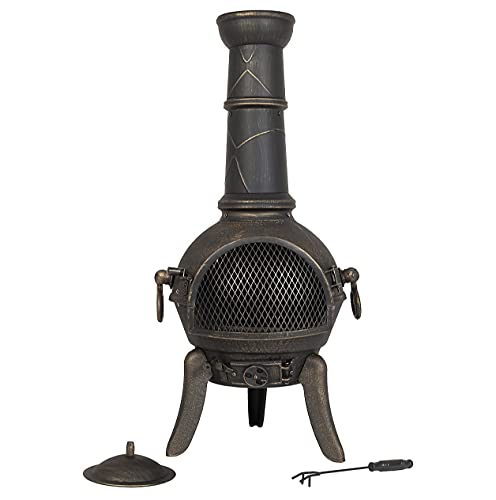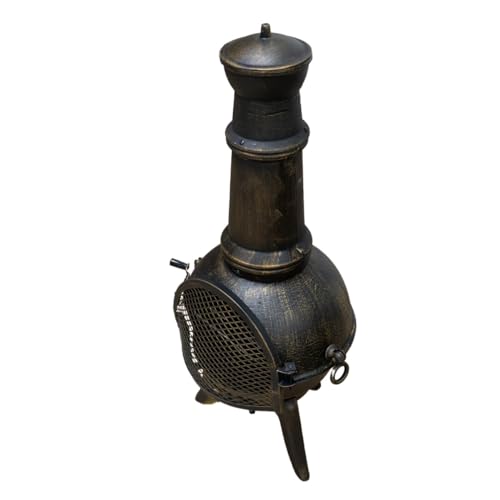Who's The Top Expert In The World On Chimineas?
Page Information

Content
 Using Chimineas Properly
Using Chimineas ProperlyChimineas, similar to a firepit, add warmth to your outdoor space, while providing a rustic look. But they also offer more control over smoke due to their chimney stack which will funnel smoke upwards.
In contrast to traditional stoves with potbelly, they are available in a variety of modern designs that can be adapted to any decor. They're made of a variety materials, like cast iron, clay, and aluminium.
 Size
SizeThe chiminea's popularity is a testament to its unique combination of functionality and aesthetics. Its unique shape, reminiscent of a bulb or a garlic clove is the result of centuries of evolution in form and material.
Historically, the fire pit was made of clay, but modern innovations have included metals like cast iron and aluminum. Contrary to clay these materials provide better durability and resistance to weather. In many instances the move to new materials has also allowed for innovative design features that enhance the overall appearance of a chiminea for the garden as well as increase its usage.
Some modern chimineas sport a more contemporary design however most are designed like the classic pot-belly with an expansive base. Whatever style is preferred, a key feature of all chimineas is the fact that they provide the safety of outdoor fires without the smoke, ash, or cinders that are produced by other kinds of backyard fire pits.
Chimineas are great to heat decks, patios and porches. They can also be used as a centerpiece for an outdoor dining area or lounge. They can also be used to cook over and are usually equipped with a grate as well as a cooking rack for added flexibility.
If you choose to cook with your chiminea, make sure that it is located in an open and clear space, far from bushes or shrubbery, to minimize the risk of smoke damage or fire. It is recommended to put the chiminea in a clear area, since heat can travel a long distance.
When not in use, a chiminea should be secured and covered with a grill or screen to stop rain or other debris from destroying the structure. When not in use the chiminea needs to be cleaned and oiled regularly to ensure that it looks good.
Chimineas made from clay and terra-cotta are beautiful and stand the test of time however, they have to be treated with care because they are fragile. For instance, hitting or dropping the chiminea with a hammer can crack it. Unsafe burning and poor maintenance can also lead to cracks or breakage.
Material
Chimineas, and other fireplaces that burn wood can create a warm and warm atmosphere in your garden. However, there is growing concern about the environmental impacts of these devices. And that's because they produce harmful pollutants such as carbon monoxide and particulate matter as they are burned. The good part is that if you follow certain guidelines and practice proper maintenance, these emissions can be reduced.
There are various chimineas that are available that are made of clay, metal, and cast iron. Each has its own distinctive characteristics that make it more or less suitable for different outdoor living spaces. Clay and Terracotta Chiminea chimineas have traditional designs that have been tested over the course of centuries. They can't withstand high temperatures, so they are only suitable for burning dry wood.
On the other hand the cast iron and steel chimineas may withstand higher temperatures and can also be used to cook food items. They are often heavier than clay models and models made of terracotta, which can make them difficult to move around.
Metal chimineas are made from a variety such as aluminum and stainless steel. The latter is more durable, less expensive and easier to maintain as compared to cast iron.
It's important to know their limitations. Cast iron chimineas, as an example, require more maintenance than stainless steel models. It can also produce more smoke which could be a nuisance for those in the vicinity of.
Maintaining your chiminea correctly is the best way to make sure it lasts as long possible. It is crucial to shield it from the elements by using an appropriate cover. Place it in your shed or garage when it's raining.
You should also regularly clean your chiminea modern, and then apply the protective coating or sealant to it. This will shield your chiminea from the elements and prevent it from breaking. Regular cleaning will keep it looking brand new. It's also crucial to position your chiminea correctly to avoid the risk of smoke and other hazards.
Style
Chimineas have a classic rustic appearance that makes them a charming garden art to create a unique Southwestern or Mexican-inspired patio design. They also function as practical outdoor fireplaces that warm backyards by radiating heat and adding a southwestern vibe to any garden.
Traditionally, chimineas were made out of terracotta or clay, and decorated with bright colors. Modern chimineas have a sleek, modern appearance that can be integrated into any patio or backyard design. Chimineas with a rounded base that tapers up into an extended, narrow chimney. Certain chimineas have an opening on the front that allows you to put pots or pans on top of the fire.
In terms of functionality Chimineas have the same function as fire pits, but with the added benefit of having a chimney that helps to remove smoke from the flame. This is particularly useful for those who live in cold winter conditions that restrict outdoor cooking. The chimney will keep the flames in check and smoke out of the way. Chimineas can be a fantastic addition to your backyard. However they require more preparation than other outdoor fireplaces that burn wood. Before lighting, pebbles or sand are put in the bottom of chimineas in order to keep them in shape and to prevent soot buildup.
Both fire pits and chimineas work well in backyards or patios, but they need ample space around them to ensure they are safe. They must be at least 10 feet away from your home, furniture, or anything else that might be burned or smoke from the fire. The chimney of the chiminea also needs to be dried out by igniting small, controlled fires for a period of three or four hours prior to being able to use it for full-out flames and high temperatures.
While chimineas may look more traditional, there are many styles and materials available that will work with any garden design. They can even be used as an accent in contemporary or modern designs, especially when they are made from a material that is less likely to break or crack. Gas-powered chimineas are available to provide added safety and convenience.
Safety
When properly used, chimineas add to your outdoor space by heating your patio and surrounding areas and projecting warmth outward. As with any fire pit or fireplace, it is important to adhere to the appropriate safety measures to ensure that your new addition will last for a long time and will be secure for everyone who uses it.
When putting your chiminea up it is essential to put a bed of pea gravel and sand underneath. This will prevent any water puddles from forming and also help the chiminea terracotta to retain heat longer and prevent cracking. It is also essential to keep a chiminea covered when it is it is not in use. This will shield the chiminea from sun, rain and sudden temperature fluctuations that could cause damage.
Chimineas are hefty when filled with fuel, which is why it is essential to put them on a level surface. Ideally this should be a brick or concrete patio, but they can also be placed on a deck raised. Make sure that the area around your chiminea is clear of any flammable objects like sheds or bushes. This will prevent any embers from falling and creating the risk of a fire.
A simple spark arrestor could be a great addition to your chiminea. They are available in any hardware store and are easy to put in. The purpose of a spark arrestor is to direct sparks that escape into the chimney, rather than falling onto nearby structures or vegetation.
The distance between your chiminea and other structures, or trees will depend on the weather conditions and your outdoor space. However, a general rule of thumb is to keep it at least 10 feet from your home or any other combustible items.
It is important to keep your chiminea clean and clean it regularly regardless of whether or not you chose an aluminized or clay chiminea. Taking the time to do this will extend its life and ensure the safety of your family. Follow these easy steps to make your biggest chiminea a great source of heat for your patio all year.
- PreviousA Look At The Future: What Will The Larder Fridge Industry Look Like In 10 Years? 24.10.23
- Next10 Misconceptions Your Boss Holds Regarding Window Handles For Wooden Windows 24.10.23
Comment list
There are no registered comments.
